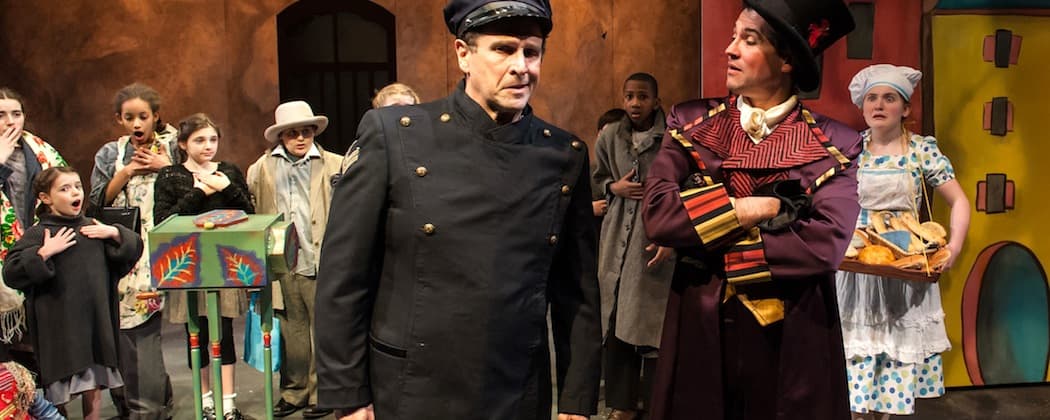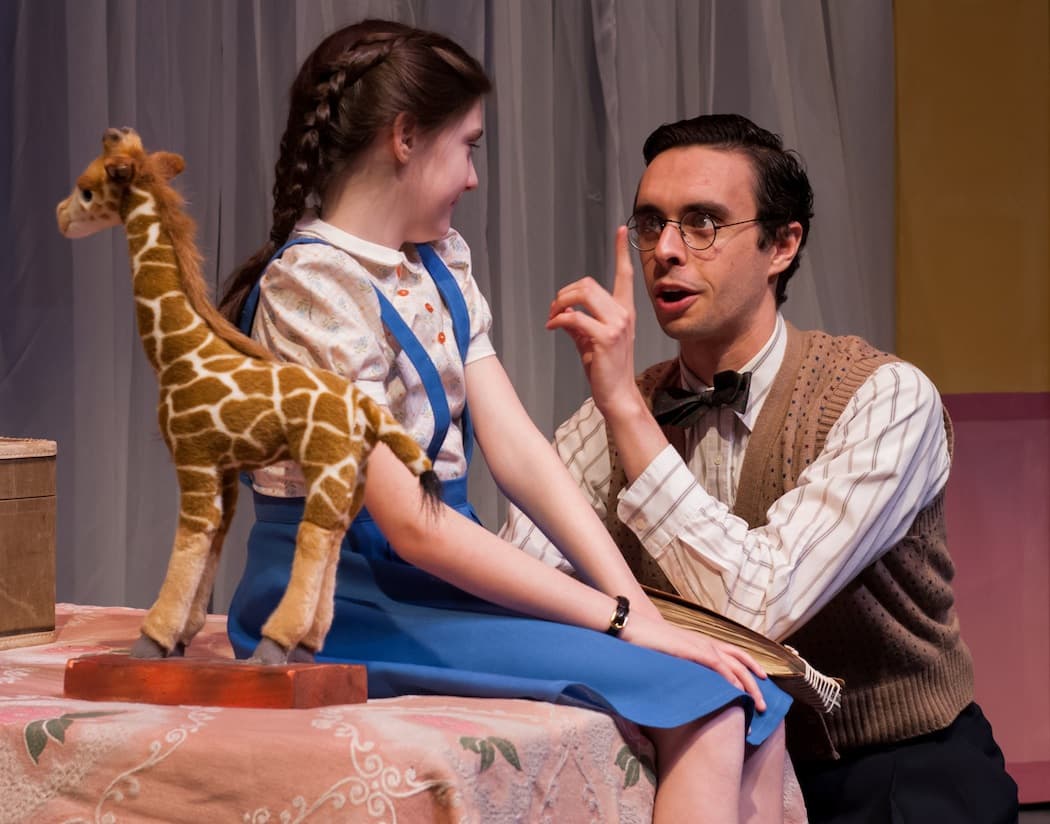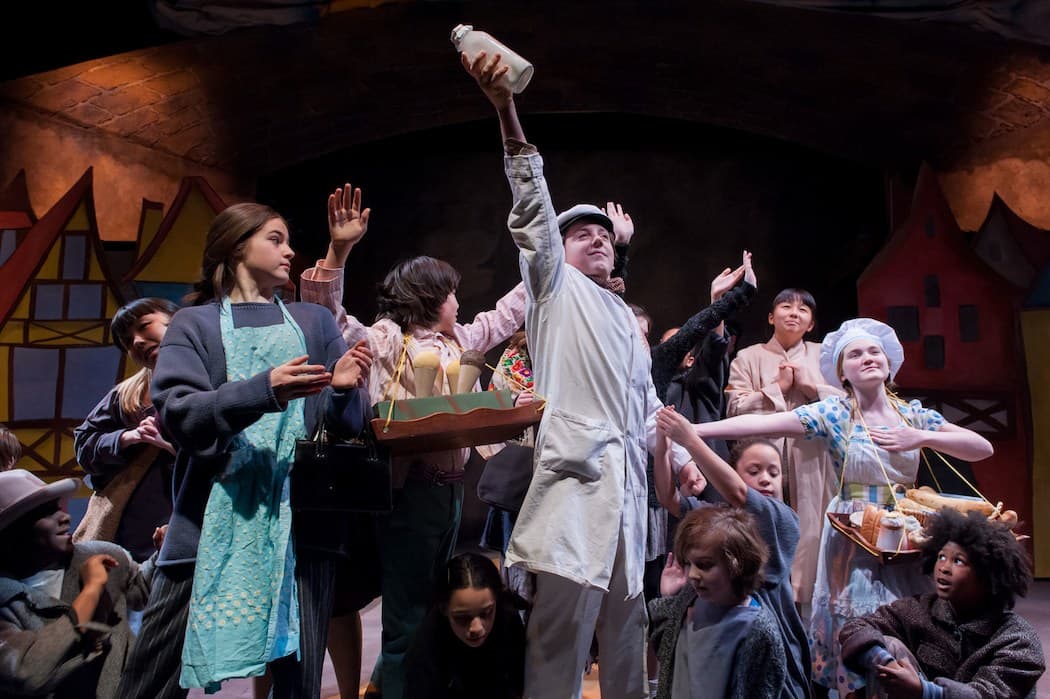Advertisement
Kushner's 'Brundibar' Is Pretty Wunderbar In Central Square

CAMBRIDGE, Mass. — The world will always have its bullies, whether they be neighborhood thugs or heads of state. When Hans Krása put those thoughts to music in his charming little children’s opera, "Brundibár," he didn’t know how right he was. His native Prague was coming apart and his sermon was, if we all stick together we can get through this.
But the time was 1938 and the biggest bully of the 20th century was about to make any prospect of hope suspect. Krása, himself, would lose his life in Auschwitz, but not before “Brundibár” was performed about 50 times in Theresienstadt, where he had been sent.
“Brundibár” did not die with him, however. Visual artist Maurice Sendak and playwright Tony Kushner collaborated on a stunning book and, later, a musical of “Brundibár” at the Berkeley Repertory Theatre and Yale Repertory Theatre. For children it was a great lesson in standing up to bullies and standing together. For adults, armed with the knowledge of what happened to Hitler’s victims it was something else again — it taught the same lesson, but with the realization that you don’t get rid of bullies so easily. And even when you do stop them, they’ll be back in one form or another.
Now Underground Railway Theater and director Scott Edmiston have taken the bold step of staging “Brundibár” with no Sendakian distancing (at the Central Square Theater through April 8). At Yale it was staged with a Martinu opera, “Comedy on the Bridge,” that also cloaked its wartime metaphors.
Edmiston and URT, instead, pair it with another Kushner piece, “But the Giraffe!,” which leaves nothing to the imagination about where a young girl and her extended family are headed. They’ve been told they can only bring one suitcase and she has to decide between her toy giraffe and the score for an opera, called “Brundibár”

And if that isn’t plain enough, after the intermission the audience walks back into a theater where a group of children are in Theresienstadt sitting morosely on their bunks. It all looks depressing until the children unfurl the simple set design and break into song and dance. The adults from the first story play the musical instruments, much as they would have at the camp. (It’s not a long night, by the way, only 90 minutes)
Theresienstadt, of course, was the infamous concentration camp that was a showcase for how well Hitler was supposedly treating the Jews, who were seemingly free to pursue art and culture of various kinds. It would turn out to be a showcase for how easily the world was duped, including the International Red Cross, which bestowed its blessing on the camp.
“Brundibár” itself, is the story of a boy and girl who go into town to get milk for their sickly mother and find the children of the town under the control of the organ-grinding bully, Brundibár. Eventually they realize if they stand together they can make him stand down.
The New Haven production was incredibly polished, with an internationally known trio of singer-actors, the Yale School of Music Orchestra and an excellent children’s chorus. The Huntington Theatre Company toyed with bringing “Brundibár” here, but backed off.
What the Underground Railway Theater lacks in that kind of bling, it makes up for in raw emotional power — plus who knew that Jeremiah Kissel was such an effective singer in addition to his acting talent. Not every child in the group is going to be an American Idol contestant, but that, too, gives this “Brundibár” a poignance and a sense of what the concentration camp performances were like, as well as a sense of how good the Underground outreach program is.

There’s no orchestra here, but the excellent pianist Todd C. Gordon keeps the tuneful score melodiously grounded while the actors play instruments and don animal outfits. Again, this isn’t Julie Taymor territory, but the naturalism of their performances, like the non-Sendakian set design, is profound. (Phil Berman, in particular, is a delightful dog.) Gordon, Edmiston and choreographer Ilyse Robbins keep everything moving crisply.
The Undergrounders do full justice to Kushner’s libretto, which is clever and playful, without sugarcoating anything as in this excerpt by Brundibár which is kind of funny until the punchline:
Little children, how I hate 'em
How I wish the bedbugs ate 'em!
How their parents overrate 'em!
If they're rude exterminate them.
Speaking of which, John F. King all but steals the show as Brundibár. Some productions are afraid to unleash the full charisma of the bad guy. Not this one, certainly.
In short, this is a tremendously moving production. It doesn’t erase memories of the Sendak production, but I think Tony Kushner would be very happy with the powerfulness of this one. As would Hans Krása. Whatever tears are shed for him and the children of the original production are balanced by the immortality they’ve achieved with their message of never giving in to one’s fears and selfishness.
